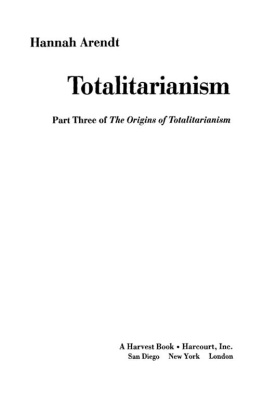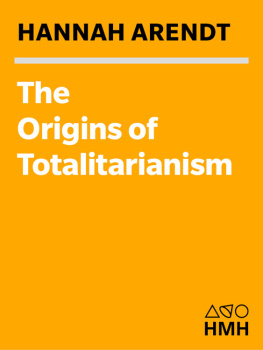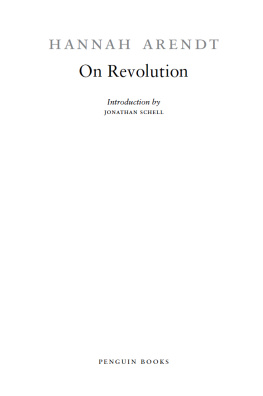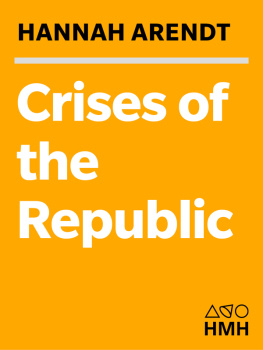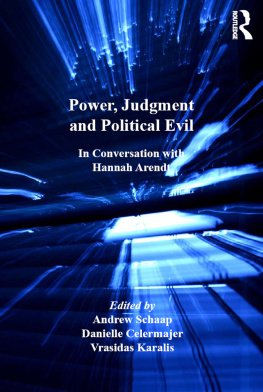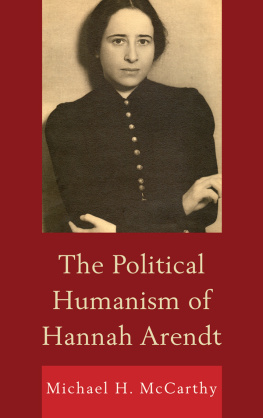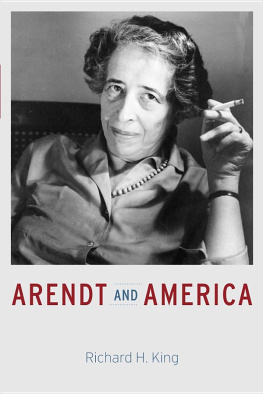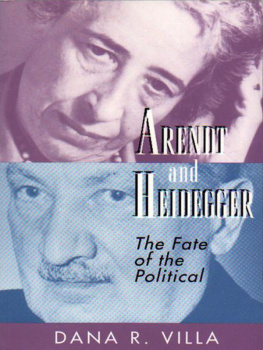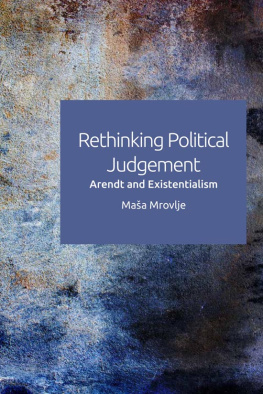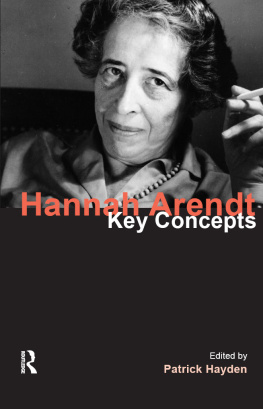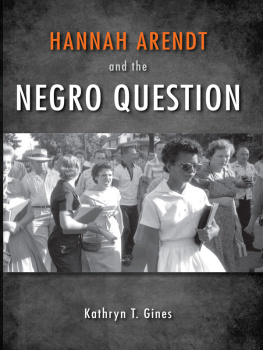Hannah Arendt - On Violence
Here you can read online Hannah Arendt - On Violence full text of the book (entire story) in english for free. Download pdf and epub, get meaning, cover and reviews about this ebook. year: 2011, publisher: Harcourt, genre: Science. Description of the work, (preface) as well as reviews are available. Best literature library LitArk.com created for fans of good reading and offers a wide selection of genres:
Romance novel
Science fiction
Adventure
Detective
Science
History
Home and family
Prose
Art
Politics
Computer
Non-fiction
Religion
Business
Children
Humor
Choose a favorite category and find really read worthwhile books. Enjoy immersion in the world of imagination, feel the emotions of the characters or learn something new for yourself, make an fascinating discovery.
- Book:On Violence
- Author:
- Publisher:Harcourt
- Genre:
- Year:2011
- Rating:3 / 5
- Favourites:Add to favourites
- Your mark:
- 60
- 1
- 2
- 3
- 4
- 5
On Violence: summary, description and annotation
We offer to read an annotation, description, summary or preface (depends on what the author of the book "On Violence" wrote himself). If you haven't found the necessary information about the book — write in the comments, we will try to find it.
On Violence — read online for free the complete book (whole text) full work
Below is the text of the book, divided by pages. System saving the place of the last page read, allows you to conveniently read the book "On Violence" online for free, without having to search again every time where you left off. Put a bookmark, and you can go to the page where you finished reading at any time.
Font size:
Interval:
Bookmark:
Copyright 1970, 1969 by Hannah Arendt
All rights reserved.
No part of this publication may be reproduced or transmitted in any form or by any means, electronic or mechanical, including photocopy, recording, or any information storage and retrieval system, without permission in writing from the publisher.
For information about permission to reproduce selections from this book, write to Permissions, Houghton Mifflin Harcourt Publishing Company, 215 Park Avenue South, New York, New York 10003.
www.hmhbooks.com
Library of Congress Catalog Card Number: 74-95867
ISBN 978-0-15-669500-8 (Harvest: pbk.)
eISBN 978-0-547-54308-6
v2.0513
For Mary
in Friendship

it is a game that bears no resemblance to whatever war games preceded it. Its rational goal is deterrence, not victory, and the arms race, no longer a preparation for war, can now be justified only on the grounds that more and more deterrence is the best guarantee of peace. To the question how shall we ever be able to extricate ourselves from the obvious insanity of this position, there is no answer.
the revolution of technology, a revolution in toolmaking, was especially marked in warfare. The very substance of violent action is ruled by the means-end category, whose chief characteristic, if applied to human affairs, has always been that the end is in danger of being overwhelmed by the means which it justifies and which are needed to reach it. Since the end of human action, as distinct from the end products of fabrication, can never be reliably predicted, the means used to achieve political goals are more often than not of greater relevance to the future world than the intended goals.
Moreover, while the results of mens actions are beyond the actors control, violence harbors within itself an additional element of arbitrariness; nowhere does Fortuna, good or ill luck, play a more fateful role in human affairs than on the battlefield, and this intrusion of the utterly unexpected does not disappear when people call it a random event and find it scientifically suspect; nor can it be eliminated by simulations, scenarios, game theories, and the like. There is no certainty in these matters, not even an ultimate certainty of mutual destruction under certain calculated circumstances. The very fact that those engaged in the perfection of the means of destruction have finally reached a level of technical development where their aim, namely, warfare, is on the point of disappearing altogether by virtue of the means at its disposal but the simple fact that no substitute for this final arbiter in international affairs has yet appeared on the political scene. Was not Hobbes right when he said: Covenants, without the sword, are but words?
Nor is a substitute likely to appear so long as national independence, namely, freedom from foreign rule, and the sovereignty of the state, namely, the claim to unchecked and unlimited power in foreign affairs, are identified. (The United States of America is among the few countries where a proper separation of freedom and sovereignty is at least theoretically possible insofar as the very foundations of the American republic would not be threatened by it. Foreign treaties, according to the Constitution, are part and parcel of the law of the land, andas Justice James Wilson remarked in 1793to the Constitution of the United States the term sovereignty is totally unknown. But the times of such clearheaded and proud separation from the traditional language and conceptual political frame of the European nation-state are long past; the heritage of the American Revolution is forgotten, and the American government, for better and for worse, has entered into the heritage of Europe as though it were its patrimonyunaware, alas, of the fact that Europes declining power was preceded and accompanied by political bankruptcy, the bankruptcy of the nation-state and its concept of sovereignty.) That war is still the ultima ratio, the old continuation of politics by means of violence, in the foreign affairs of the underdeveloped countries is no argument against its obsoleteness, and the fact that only small countries without nuclear and biological weapons can still afford it is no consolation. It is a secret from nobody that the famous random event is most likely to arise from those parts of the world where the old adage There is no alternative to victory retains a high degree of plausibility.
Events, by definition, are occurrences that interrupt routine processes and routine procedures; only in a world in which nothing of importance ever happens could the futurologists dream come true. Predictions of the future are never anything but projections of present automatic processes and procedures, that is, of occurrences that are likely to come to pass if men do not act and if nothing unexpected happens; every action, for better or worse, and every accident necessarily destroys the whole pattern in whose frame the prediction moves and where it finds its evidence. (Proudhons passing remark, The fecundity of the unexpected far exceeds the statesmans prudence, is fortunately still true. It exceeds even more obviously the experts calculations.) To call such unexpected, unpredicted, and unpredictable happenings random events 01 the last gasps of the past, condemning them to irrelevance or the famous dustbin of history, is the oldest trick in the trade; the trick, no doubt, helps in clearing up the theory, but at the price of removing it further and further from reality. The danger is that these theories are not only plausible, because they take their evidence from actually discernible present trends, but that, because of their inner consistency, they have a hypnotic effect; they put to sleep our common sense, which is nothing else but our mental organ for perceiving, understanding, and dealing with reality and factuality.
What all these uncomfortable novelties add up to is a complete reversal in the relationship between power and violence, foreshadowing another reversal in the future relationship between small and great powers. The amount of violence at the disposal of any given country may soon not be a reliable indication of the countrys strength or a reliable guarantee against destruction by a substantially smaller and weaker power. And this bears an ominous similarity to one of political sciences oldest insights, namely that power cannot be measured in terms of wealth, that an abundance of wealth may erode power, that riches are particularly dangerous to the power and well-being of republicsan insight that does not lose in validity because it has been forgotten, especially at a time when its truth has acquired a new dimension of validity by becoming applicable to the arsenal of violence as well.
and it is all the more noteworthy for evidently not being an abstract notion in the history of ideas. (If one turns the idealistic concept of thought upside down, one might arrive at the materialistic concept of labor; one will never arrive at the notion of violence.) No doubt all this has a logic of its own, but it is one springing from experience, and this experience was utterly unknown to any generation before.
The pathos and the lan of the New Left, their credibility, as it were, are closely connected with the weird suicidal development of modern weapons; this is the first generation to grow up under the shadow of the atom bomb. They inherited from their parents generation the experience of a massive intrusion of criminal violence into politics: they learned in high school and in college about concentration and extermination camps, about genocide and torture,
just as the universities cannot afford not to accept federal funds; but this means no more than that they must learn how to sterilize financial support (Henry Steele Commager), a difficult but not impossible task in view of the enormous increase of the power of universities in modern societies.) In short, the seemingly irresistible proliferation of techniques and machines, far from only threatening certain classes with unemployment, menaces the existence of whole nations and conceivably of all mankind.
Next pageFont size:
Interval:
Bookmark:
Similar books «On Violence»
Look at similar books to On Violence. We have selected literature similar in name and meaning in the hope of providing readers with more options to find new, interesting, not yet read works.
Discussion, reviews of the book On Violence and just readers' own opinions. Leave your comments, write what you think about the work, its meaning or the main characters. Specify what exactly you liked and what you didn't like, and why you think so.


